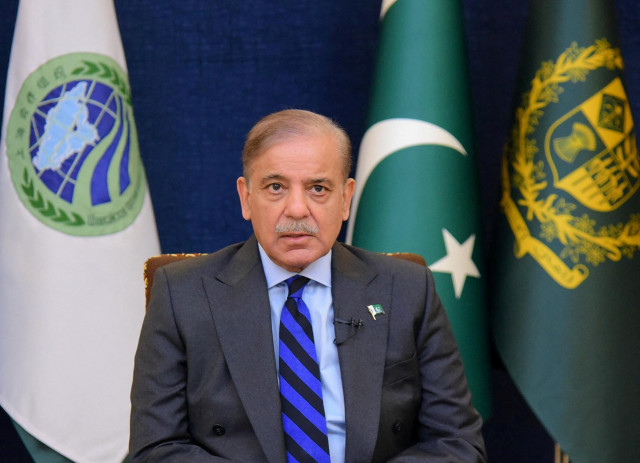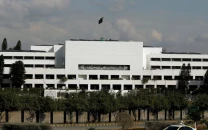PM urges diplomatic prudence on terrorism
Shehbaz calls for SCO joint action to counter economic recession, terrorism, climate change

Prime Minister Shehbaz Sharif on Tuesday impressed upon the Shanghai Cooperation Organization (SCO) member states to condemn all forms terrorism, including state terrorism, “unambiguously” and avoid “diplomatic point-scoring” on this issue.
Addressing the 23rd SCO Council of Heads of State (CHS), held in video conference format, Shehbaz cautioned against the dangers of violent ultra-nationalism and demonisation of religious minorities in pursuit of domestic political agendas.
“The Hydra-headed monster of terrorism and extremism — whether committed by individuals, societies or states — must be fought by full vigour and conviction,” the prime minister told the SCO-CHS.
Shehbaz said that the SCO member states must take concerted actions against terrorism, extremism, and separatism, both in their national capacities and under the Regional Anti-Terrorist Structure (SCO-RATS).
“Any temptation to use it [terrorism and extremism] as a cudgel for diplomatic point-scoring must be avoided under all circumstances,” the prime minister continued. “There is no justification for killing people,” Shehbaz said.
The prime minister emphasised that sustainable peace could only be established by granting fundamental rights and freedoms to the people.
“The religious minorities should not be marginalised in the garb of political agenda,” he warned.
In his speech to the nine-nation bloc, currently chaired by India, Prime Minister Shehbaz did not mention any country or leader but it was seen as a riposte, veiled beneath the diplomatic norms, to New Delhi’s oft-repeated criticism of Islamabad over terrorism.
Last month, the joint statement issued after Modi’s meeting with US President Joe Biden at the White House “called on Pakistan to take immediate action to ensure that no territory under its control is used for launching terrorist attacks”.
In May, when Foreign Minister Bilawal Bhutto Zardari visited India to attend the SCO Council Foreign Ministers meeting, his Indian counterpart, S Jaishankar, called him a spokesperson of terrorism.
Against this backdrop, the prime minister highlighted the sacrifices made by Pakistan in fighting the scourge of terrorism, which he described as a phenomenon that continued to plague the region and a “serious obstacle” to peace and stability.
Again, without referring to any specifics, Shehbaz stressed that religious minorities should not be demonised in the pursuit of domestic political agendas. “It is by granting fundamental rights and freedoms to all people that sustainable peace can be established.”
Shehbaz called for joint action by the member states to address the common challenges of economic recession, terrorism, and climate change, stressing that regional organisation could play the role of “beacon of peace, stability, and progress”.
He said that the SCO-CHS was held at a critical juncture as the world faced socio-economic challenges.
“The SCO represents a promising future only if we seize the opportunity to achieve the shared goals for the region’s peace and prosperity,” he added.
Terming regional connectivity a defining feature of the modern economy, Prime Minister Shehbaz emphasised the need for focus on investment in this area as a “vehicle of peace and prosperity”.
He mentioned that the China-Pakistan Economic Corridor (CPEC) could become a game-changer in view of Pakistan’s location in the region. He announced that Pakistan was planning to host a regional connectivity conference in the last quarter of the current year.
On climate-induced disasters, the prime minister said the situation demanded global solidarity as it was the time to act “now and immediately”.
Shehbaz also said that poverty alleviation must be a priority in the wake of economic recession.
On Islamophobia, he said peace and communal harmony were the need of the hour.
He emphasised adherence to the resolutions of the UN Security Council to settle the issues amicably “before it was too late”.
Shehbaz underlined the need for concerted response at the SCO forum to the global geo-political flux by prioritising the shared vision of an economically integrated region.
He also threw light on Pakistan's geostrategic location as a bridge between Asia and Europe.
While building a case for enhanced international engagement with the Afghan interim government as a necessary condition to unlock the potential of the SCO, he urged the Afghan authorities to deliver on their global commitments.
He thanked India for its stewardship of the SCO during the past year and congratulated Kazakhstan for assuming the chair for the next year. He congratulated the president of Iran on his country’s inclusion in the organisation as a full member.
The SCO-CHS was attended by Chinese President Xi Jinping, Russian President Vladimir Putin, Indian Prime Minister Narendra Modi, United Nations Secretary-General Antonio Guterres, Kazakhstan’s President Kassym-Jomart Tokayev, Tajikistan’s President Emomali Rahmon, Uzbekistan’s President Shavkat Mirziyoyev, and Iranian President Ebrahim Raisi, besides other leaders of the observer states.
At the end of the meeting, the SCO leaders approved 14 important documents, including the New Delhi Declaration, which articulated the collective stance of the SCO member states on strategic and geopolitical issues of common interest.
They also adopted two joint statements on Strategies to Counter Radicalisation Leading to Terrorism, Extremism and Separatism; and Cooperation in Digital Transformation; as well as the SCO Economic Development Strategy.
The New Delhi Declaration sought to forge closer ties and boost cooperation within the expanding Eurasian group but stressed that it opposed bloc, ideological, and confrontational approaches to address problems and security challenges.
The leaders were critical of the negative impact of "unilateral and unlimited expansion of global missile defence systems by certain countries or groups of countries", without directly referring to Nato's expansion and Western military assistance to Ukraine.
Expressing concern over the situation in Afghanistan, the leaders said they considered "it essential to establish an inclusive government in Afghanistan with the participation of representatives of all ethnic, religious and political groups in Afghan society".
All members, bar India, also supported China's vast Belt and Road Initiative (BRI) scheme which envisioned rebuilding the old Silk Road to connect China with Asia, Europe and beyond with large infrastructure spending.
As a Eurasian security and political group formed in 2001 by Beijing and Moscow, the SCO includes India, Pakistan, Kazakhstan, the Kyrgyz Republic, Tajikistan and Uzbekistan. Iran joined the grouping on Tuesday, becoming its ninth member.
(WITH INPUT FROM NEWS DESK)



















COMMENTS
Comments are moderated and generally will be posted if they are on-topic and not abusive.
For more information, please see our Comments FAQ